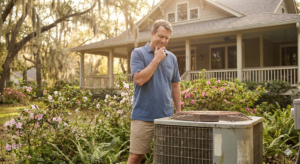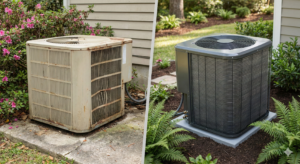It doesn’t take much for Charleston’s humid, warm weather to make you appreciate a working air conditioner. But if you walk into your home and realize the air feels sticky or warm, and your unit is covered in ice, your AC may have frozen up. Even though it might seem strange, an AC freeze-up is a pretty common problem for homeowners around here, especially during high-use months when the system runs more frequently.
When your AC freezes, it can’t cool your home properly and could end up damaging itself if not handled quickly. Ignoring it or trying temporary fixes can lead to more expensive repairs. Whether it’s just a light frost or a block of ice wrapping around your AC coils, it’s best to deal with it as soon as possible. Here’s how to spot the signs, take a few safe steps at home, and understand what might be causing the problem.
Identifying Signs Of A Frozen AC
It’s not always obvious your air conditioner is frozen at first. Things might seem normal until the house starts to feel warmer than usual, or you notice something odd coming from the vents. Paying attention to those small warning signs can help you fix the issue before it becomes a bigger problem.
Here are a few clear signs your AC may be frozen:
– The air coming out of your vents is weak or not cool
– Ice or frost is visible on the evaporator coil or refrigerant lines
– You hear strange noises like hissing or rattling from the unit
– Your AC is running, but the house is still warm
– Water starts dripping or pooling around the inside unit
When your AC keeps trying to run while frozen, it puts a strain on the system. That could push the unit harder than it should work and cause even more damage, especially to the compressor. So the minute you notice one or more of these signs, it’s time to take action and give the system a break.
Immediate Steps To Take When Your AC Freezes Up
If you think your AC has frozen, resist the urge to crank it back to a lower temperature to make it work harder. That might feel like a logical move, but it’ll do the opposite. Here’s what to do instead:
1. Turn off the system: Start by switching your thermostat to OFF. This keeps the system from running and lets it begin thawing.
2. Set the fan to ON: If your AC has a setting that lets just the fan run without cooling, turn it on. This will help warm air circulate around the coils and melt the ice faster.
3. Wait for it to thaw completely: Depending on how frozen the unit is, this could take several hours. Don’t restart the AC until you’re sure all the ice is gone.
4. Check your air filter: A dirty filter can block airflow and cause freezing. If your filter looks dusty or clogged, go ahead and replace it.
It’s a good idea to keep pets and kids away from the indoor unit while it’s thawing, especially if water begins to collect around the base. Set out towels or a shallow container underneath the indoor system to catch drips if needed.
Once the ice melts, if your AC seems to work normally again, that’s a good sign. But chances are something triggered the freeze, and if you don’t fix the cause, the problem will come right back. That’s why figuring out what led to the freeze is the next big step.
Common Causes Of AC Freezing And How To Address Them
Once your AC starts working again, it’s important to figure out what caused the freeze-up in the first place. This usually ties back to airflow problems or refrigerant issues — two things that can keep your system from moving heat the way it should.
One of the most common causes is dirty air filters. If the filter is clogged, airflow gets restricted, which prevents the coils inside your unit from staying warm enough. When the air doesn’t move as it should, condensation builds up on the coils and freezes. That layer of ice then blocks more airflow, and it turns into a cycle.
Another reason your AC might ice over is dirty evaporator coils. Even with a clean filter, dust and debris can collect on the coils over time. That buildup acts like insulation, trapping cold air around the coil and reducing the system’s ability to regulate temperature. This can result in freeze-ups, especially during long cooling cycles in Charleston’s late summer heat.
Low refrigerant levels are also a known culprit. When the system is low on refrigerant, pressure inside the coils drops. That drop causes the coils to get colder than normal, which leads to ice buildup. And if there’s a leak somewhere, it can affect your system performance in other ways too, like making your AC run constantly or take longer to cool down.
Blocked air registers or closed vents can mess with airflow as well. You might think you’re saving energy by closing off certain areas of the house, but doing that can back up your airflow and throw the system out of balance. That puts unnecessary pressure on your AC and increases the chances of it freezing.
To prevent another freeze-up, it’s smart to have your entire system inspected. That way, you’re not guessing at the cause — someone can assess filters, refrigerant levels, coil condition, and how well air is circulating through each room.
Professional Solutions For Avoiding Future Freeze-Ups
Even if your AC thawed and seems fine now, there’s often a bigger issue behind the problem. It’s one thing to handle surface-level symptoms, but it’s another to make sure your system works like it should when the weather heats up again. That’s where some professional help makes a big difference.
Technicians have the tools and training to check refrigerant pressure accurately, test for leaks, and clean coils deep inside the unit. These aren’t things that most homeowners have the tools or time to do on their own. A proper inspection also includes checking your thermostat and making sure it doesn’t trigger cooling cycles that are too frequent or too long, which can also cause freezing problems.
Ductwork is another big factor. If your ducts are leaking, crushed, or full of dust, your system has to work harder to keep up. Sealing and cleaning the ducts can restore airflow, which helps stop that freeze cycle before it starts. In some Charleston homes, especially older ones, duct issues go unnoticed for years. This leads to strange airflow patterns, hot and cold spots, and more wear on your AC over time.
A good maintenance routine lowers the chances of parts wearing out early or small issues turning into system failures. Having someone look at your AC before peak cooling season kicks in helps reduce surprises down the road. And when there’s consistent care, your system can push through Charleston’s humid stretches without struggling or freezing up.
Keep Your AC Running Smoothly In Charleston
AC freeze-ups can fool you. They seem scary in the moment but usually point back to fixable causes. Whether it’s a dirty filter, blocked coil, low refrigerant, or airflow issue, the key is getting to the root before it turns into something bigger. Waiting it out or ignoring repeat freeze-ups tends to stress your system more, and breakdowns are never fun when it’s hot outside.
If your AC froze once, chances are it could happen again. That’s why paying attention to signs early and making sure all parts of your system are working together really matters. Whether it’s a late summer day in Charleston or the first hint of fall, you want your AC to work when you need it most. Taking the right steps now means fewer interruptions, better comfort, and a home that stays cool without the drama.
Keeping your AC running smoothly is important, especially in Charleston’s humid climate. If you’re dealing with frequent freeze-ups or airflow problems, trust the team at Coastal Carolina Comfort to help. Learn more about how we can provide reliable AC help in Charleston to keep your home comfortable no matter the season.


